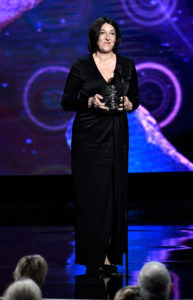Angelika Amon wins 2019 Breakthrough Prize in Life Sciences
Four other MIT researchers to receive New Horizons Prizes in math and physics; two alumni win Breakthrough Prize in Fundamental Physics

Angelika Amon attends the 2019 Breakthrough Prize at NASA Ames Research Center on November 4, 2018 in Mountain View, California. (Photo by Steve Jennings/Getty Images for Breakthrough Prize)
Angelika Amon, an MIT professor of biology, is one of five scientists who received a 2019 Breakthrough Prize in Life Sciences, given for transformative advances toward understanding living systems and extending human life. The award comes with a $3 million prize.
Amon, the Kathleen and Curtis Marble Professor in Cancer Research and a member of MIT’s Koch Institute for Integrative Cancer Research, was honored for her work in determining the consequences of aneuploidy, an abnormal chromosome number that results from mis-segregation of chromosomes during cell division.
“On behalf of the School of Science, I congratulate Angelika Amon for this extraordinary honor, in recognition of her brilliant work that expands our understanding of cellular mechanisms that may lead to cancer,” says Michael Sipser, dean of the MIT School of Science and the Donner Professor of Mathematics. “We celebrate all recipients of these prestigious awards, including MIT’s four researchers whose impressive early-career achievements in physics and mathematics are being recognized. Our scientists pursue fundamental research that advances human knowledge, which in turn leads to a better world.”
Two MIT alumni, Charles Kane PhD ’89 and Eugene Mele PhD ’78, both professors at the University of Pennsylvania, shares a Breakthrough Prize in Fundamental Physics. Kane and Mele were recognized for their new ideas about topology and symmetry in physics, leading to the prediction of a new class of materials that conduct electricity only on their surface.
New Horizons winners
Three MIT physics researchers received the $100,000 New Horizons in Physics Prize, awarded to promising junior researchers who have already produced important work.
Lisa Barsotti, a principal research scientist at MIT’s Kavli Institute, and Matthew Evans, an MIT associate professor of physics, shares the prize with Rana Adhikari of Caltech for their work on ground-based detectors of gravitational waves. Daniel Harlow, an MIT assistant professor of physics, shares the prize with Daniel Jafferis of Harvard University and Aron Wall of Stanford University for their work generating fundamental insights about quantum information, quantum field theory, and gravity.
Additionally, Chenyang Xu, an MIT professor of mathematics, received a 2019 New Horizons in Mathematics Prize for his work in the minimal model program and applications to the moduli of algebraic varieties.
“Angelika Amon is a brilliant scientist and outstanding teacher. Her work demonstrates the enormous impact of curiosity-driven basic biological research,” says Alan Grossman, department head of biology. “She studies the control of cell division and the effects of mistakes that lead to cells with different numbers of chromosomes. Starting first with baker’s yeast, and more recently studying similar problems in human cells, her findings help explain fundamental mechanisms in cell biology, cell growth, and underlying causes of diseases related to abnormalities in chromosome number, including cancer. She is extremely deserving of this prize.”
Chromosome imbalance
Most living cells have a defined number of chromosomes. Human cells, for example, have 23 pairs of chromosomes. However, as cells divide, they can make errors that lead to a gain or loss of chromosomes.
Amon has spent much of her career studying how this condition affects cells. When aneuploidy occurs in embryonic cells, it is almost always fatal to the organism. For human embryos, extra copies of any chromosome are lethal, with the exceptions of chromosome 21, which produces Down syndrome; chromosomes 13 and 18, which lead to developmental disorders known as Patau and Edwards syndromes; and the X and Y sex chromosomes, extra copies of which may sometimes cause various disorders but are not usually lethal.
In recent years, Amon’s lab has been exploring an apparent paradox of aneuploidy: When normal adult cells become aneuploid, it impairs their ability to survive and proliferate; however, cancer cells, which are nearly all aneuploid, can grow uncontrollably. Amon has shown that aneuploidy disrupts cells’ usual error-repair systems, allowing genetic mutations to quickly accumulate.
A better understanding of the consequences of aneuploidy could shed light on how cancer cells evolve and help to identify new therapeutic targets for cancer. Last year, Amon discovered a mechanism that the immune system uses to eliminate aneuploid cells from the body, raising the possibility of harnessing this system, which relies on natural killer cells, to destroy cancer cells.
Amon, who was informed of the prize several weeks ago, was sworn to secrecy until the October announcement.
“When I received the phone call, I was driving in the car with my daughter, and it was really hard to not be too excited and thereby spill the beans,” she says. “Of course, I am thrilled that our work is recognized in this manner.”
The 2019 Breakthrough Prize and New Horizon Prize recipients were recognized at the seventh annual Breakthrough Prize ceremony, hosted by actor, producer and philanthropist Pierce Brosnan, on Sunday, Nov. 4, at NASA Ames Research Center in Mountain View, California, and broadcast live on National Geographic.